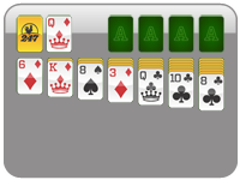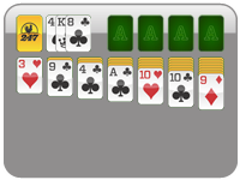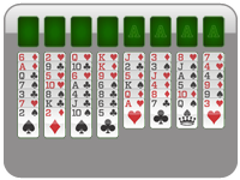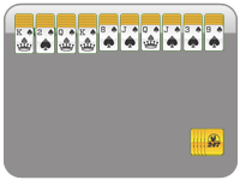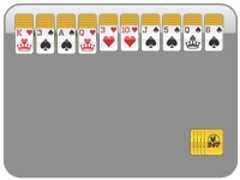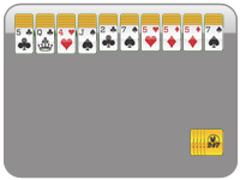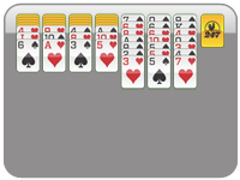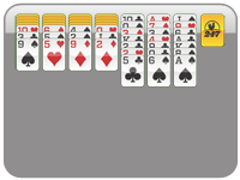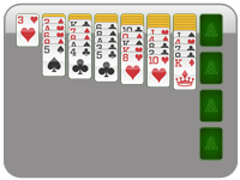Understanding the Spades Bidding Strategy
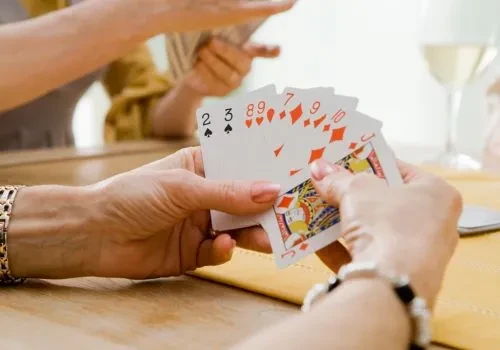
Your spades bidding strategy is essential to your path to victory. While there's no absolute rule for bidding, how to approach it can change with every hand and every game, and even who you're playing against. That's partly because determining your bid is the very first move you'll make in the game. How well (or poorly) you do at matching that bid is what sets you up for success or failure. This guide will help you learn from mistakes and start bidding with confidence.
How to Evaluate Your Hand for Smarter Bidding

Understanding your hand is the first step towards improving your spades bidding strategy. Let's take a closer look at how to evaluate cards and use that information to plan your moves.
Counting High Cards and Sure Tricks
So, the first step in learning how to count cards in spades is to focus on high cards and sure tricks. That means look for your aces and kings. Those cards are strong indicators of potential tricks. And if you've got an ace of spades? Count that as a definite win. In fact, spades trump everything here, meaning it's a fairly safe bet to assume your high spades cards are surefire wins.
You'll also want to look for void suits (or near voids), which means none of your cards belong to a certain suit (i.e. you have spades, hearts, and clubs in your hand, but no diamonds) or you only have one or two cards in that suit. This can be used to your advantage in the game by giving you the opportunity to trump later on. These shouldn't be considered sure tricks, but it's something to take into consideration before bidding.
Recognizing Risky Hands
Another thing to keep in mind when learning how to bet in spades is being able to recognize risk. What does that look like in spades? Well, it might mean you're weak across all suits, meaning lots of low cards and no face or high cards. That's when you might want to consider a nil bid (which is when you bid that you won't win any tricks). That's still a risky position considering the 100-point penalty if you fail to win the round.
Next, take a look at your midrange cards. These are cards like your 10s, 9s, and jacks. These cards aren't guaranteed wins, but they're high enough to win a round or two as the game goes on, which could rack up bags or overtricks for you. That's when you win more tricks than you bid, and that's not always a good thing.
Finally, keep an eye out for isolated high cards like a king with no backup. That gives you less room to maneuver and isn't inherently bad, but you want to have flexibility in your hand.
How to Bid with a Partner in Mind
Spades is a game that's often played in pairs. It doesn't have to be, but it's quite common, and that means you should know how to bid with your partner in mind. Your spades bidding strategy needs to account for how aggressive or conservative a player your partner is, which can be hard to estimate if you've never played together before. If you bid first, use it to signal your hand's strength to your partner, but this isn't poker. Don't overpromise if you can't actually deliver.
There's also a chance that your partner bids nil, so look closely at your hand and consider how you'll cover them. Try to plan out your wins now that you can count your partner out. Try practicing some of your strategies by playing solo on 247spades.
Strategic Bidding Tactics to Stay Competitive

Once you nail the essentials, you can level up your game with strategies to help you get the edge over your competitors. Here are a few worth trying.
When to Bid Nil or Blind Nil
Nil and blind nil are risky strategies that aren't the best for beginners! That said, the payoff is huge if you can pull it off. Nil winners get 100 points for their hand, and blind nil winners get 200 points. A great nil hand will have lots of low and midrange cards and, most importantly, weak spades. If you've got any face cards, it's probably not the smartest bet.
Blind nil is much riskier because you can't see your hand before bidding. It's more of a Hail Mary strategy and should only really be deployed if your time is seriously behind in the score. Coordinate with your partner to support and defend your nil bids.
Avoiding Overbidding and Underbidding
When learning how to bet in spades, remember: this isn't poker. Spades is not a bluffing game because you cannot protect yourself from the lie. Instead, bluffing just leads you to over- or underbidding. Overbidding is the most dangerous, because if you fail to make your bid, you earn zero points for the round. But don't underestimate the danger of underbidding. If you rack up 10 bags or more, that's a 100-point penalty. Honest bidding is the goal here. Don't bank on what you hope will happen; instead, go for what's likely.
Adapting to Table Behavior and Bidding Patterns
Just because spades isn't a bluffing game, it doesn't mean you're not paying attention to the other players. As you play, watch for patterns in how your opponents bid. You can adjust your play if opponents set you up with aggressive bids. If they're right, you'll still get the max number of points you can earn for the round. Holding back can also make sure you don't rack up too many bags if they're being overconfident. You can also look to previous rounds to estimate how hands are likely distributed. Things can change round to round and game to game, so being observant is especially helpful.
Better Bidding, Better Wins
Leading your spades bidding strategy with strong, accurate bids is how you can improve your game and your chances of winning. If you take anything away, let it be that strong bidding is all about accurate self-assessment, not straight luck. What you want to master is reading your hand, partner coordination, and controlling risk. When it's time for a high-risk play, you'll be better equipped for it. In the meantime, test your bidding skills in real games at 247Solitaire.com, where you can play spades for free, track your stats, and sharpen your strategy.
Solitaire Games
More Solitaire Games
More Games
Solitaire News
Disclaimer
DISCLAIMER: The games on this website are using PLAY (fake) money. No payouts will be awarded, there are no "winnings", as all games represented by 247 Games LLC are free to play. Play strictly for fun.

